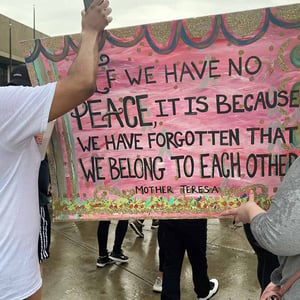 With its ominous call to “let justice prevail at the gate,” the first reading evokes images of Jon Snow holding off White Walkers at the Wall, Prof. McGonagall leading enchanted suits of armor into the Battle for Hogwarts, and Thor destroying the armies of the undead on the Bifrost. It’s the classic good versus evil, light over dark, life against death scenario that sets your adrenaline running and makes you believe in magical saviors and miraculous last stands. Moreover, it makes you believe in clear battle lines and moments of truth that are so frustratingly elusive in real life.
With its ominous call to “let justice prevail at the gate,” the first reading evokes images of Jon Snow holding off White Walkers at the Wall, Prof. McGonagall leading enchanted suits of armor into the Battle for Hogwarts, and Thor destroying the armies of the undead on the Bifrost. It’s the classic good versus evil, light over dark, life against death scenario that sets your adrenaline running and makes you believe in magical saviors and miraculous last stands. Moreover, it makes you believe in clear battle lines and moments of truth that are so frustratingly elusive in real life.
It might surprise you, then, to know Amos writes to us from a period of peace and prosperity. The reigns of Kings Uzziah of Judah and Jeroboam II of Israel saw little conflict and an economic revival. They also saw the rise of a wealthy class that feasted and luxuriated on the backs of the poor. This is the injustice Amos condemns. The battle lines he draws aren’t between hunky heroes and vile villains but between neighbors. The walking dead might give you chills, but at least you can identify them a mile away and run. How much scarier are the enemies who hide in plain sight and kill not through burning hate, but cold indifference. And where do you run when the bad guy might be you?
The parallels to our own society are almost too obvious to name. When Amos censures those who “push aside the needy from the gate” (Am. 5:12), denying them justice in the courts and dignity as human beings, it’s hard not to think of police brutality and the Black Lives Matter movement. When Amos accuses the wealthy of trampling the poor, “tak[ing] from them levies of grain” to “buil[d] houses of hewn stone” (Am. 5:11), the growing wealth gap, unemployment rate, and disproportionate tax burden looms. None of this is new, but now we face a rare moment where the battle lines are clear, the trenches are dug in, and the sides call each of us to stand where we belong. Anyone who knows me knows how sickened I am by polarization and how angered I am by blind self-righteousness, but even I admit to some cold comfort in the clarity presented by the current crisis. These divides threaten to destroy us, as they did Israel and Judah, but perhaps we can only see and avert the danger when it is poised to attack.
So what can we do? Well, prayers are not enough. We can’t compensate for systemic injustice with hymns and offerings alone. That said, I’d like to hope we aren’t so past saving as Amos seems to think Judah and Israel were. Rolling waves of justice and ever-flowing righteousness make for cool CGI, but I’d rather they stayed on the silver screen. I think we start by naming the good and the evil we see for what it is -- those who care and those who don’t. All that’s left is to pick the right side and care for all we are worth, with everything we have, no matter the stakes. Only then will justice prevail at the gates. Only then can we call ourselves heroes.



